Photo
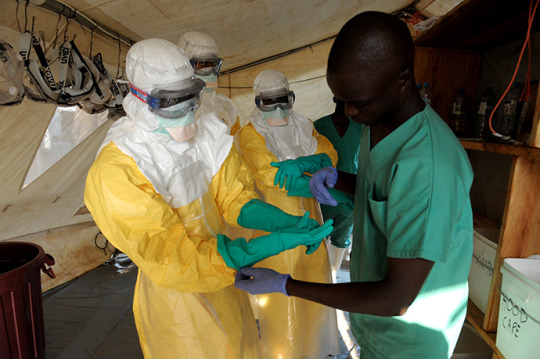
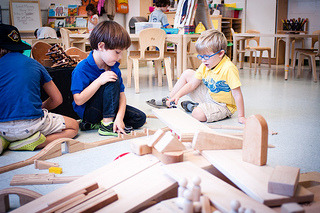
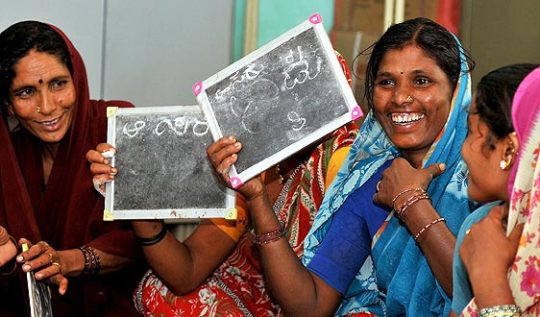
It's like that University of Chicago essay question: create a trio and explain how and why they fit together. Our trio for today is a makeshift Ebola treatment facility created by Doctors Without Borders, high-quality preschool, and micro-financing for women, suggested from an Op-Ed piece in today's Times by Nicholas Kristof.
"The Ebola Fiasco" points out that had African governments and the international community put a little more muscle and money behind preventing Ebola or containing it at the outset, the CDC wouldn't be predicting there will be 1.4 million cases by late January. Or that the UN estimates that $1 billion will be spent to control the virus.
So how do preschool and microfinancing relate to the Ebola outbreak? Investing in both helps prevent bigger headaches and heartaches later.
High-quality preschool is like an inoculation against poverty; the social skills children learn there (working out disputes, sharing, exercising restraint) resonate into adulthood, resulting in stronger marriages, better jobs and wages, and fewer visits to prison.
When governments or nonprofits provide microfinancing for poor women, their success reaps benefits not only for the women themselves but stabilizes their families and entire communities. Some studies point to a 60 percent reduction in poverty, with fewer missed meals and children spending more time in school
"It was not miraculous but [microfinancing] was working. Microcredit has earned its rightful place as one of the key instruments in the fight against poverty," said economists Abhijit Banerjee and Esther Duflo, who examined microfinance in Hyderabad, India.
The Ebola spidemic has spun out of control. Let's not let the same happen to in educating children and giving women small loans to support their families.
1 note
·
View note
Photo
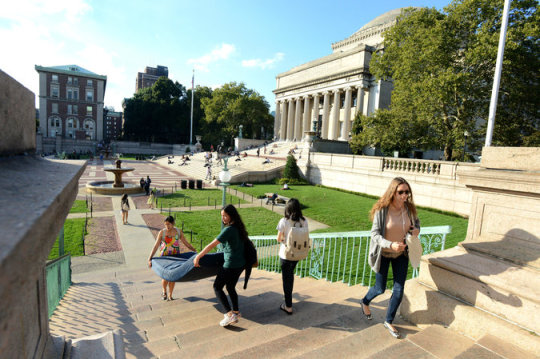
ONCE UPON A MATTRESS. Columbia University student/artist Emma Sulkowicz (above) is not reliving any sort of fairy tale, but rather protesting a nightmare, by carrying around campus a standard-issue mattress, the same kind she was raped on by a fellow student two years ago. When she took her story to campus authorities, her claim was dismissed.
Sulkowicz's performance art piece, "Carry That Weight," which she intends to carry out for the 2014-15 school year, even to her commencement, reflects the national attention focused on domestic violence in recent days:
President Obama and VIce President Biden announced Friday a national campaign called "It's On Us" to eliminate sexual assault on campuses (a White House-produced PSA played during college football games over the weekend);
Football star Ray Rice kicked off the Balitmore Ravens and suspended indefinitely by the NFL (who reportedly tended to look the other way when its players were arrested for domestic violence);
Football star Adrian Peterson sat out one game for the Minnesota Vikings (yet played the next) while facing two separate child abuse charges for striking two sons, each of whom were four years old at the time of the incidents;
Saturday's NYT featured a story about a father who killed his 28-year-old daughter, her six children, and himself, after his daughter sought a restraining order on him.
While we are outraged and saddened by the circumstances inspiring Sulkowicz's art, we applaud her courage and resolve. May our daughters and sons stand with her, and assume some of her burden.
1 note
·
View note
Photo

As the debate about the income and education gap between poor and rich in America continues to rage, we are reminded this morning that the seeds of inequality are sowed not in college or high school, but in the womb.
As husband-and-wife crusaders Nicholas Kristoff and Sheryl WuDunn write in "The Way to Beat Poverty," the lead article in the NYT's Sunday Review, teaching pregnant mothers not to drink or smoke can help keep their children in school and/or out of jail. Following up with these mothers through nurse visits for two more years teaches them how to nurture their little ones by cuddling, holding, talking and reading, to cope with fussy babies (usually alone, since many low-income moms are single), and to take advantage of birth control.
These may sound like commonsensical measures to those of us lucky enough to have been raised in loving and nurturing households, but pretty alien if you've been raised in a stressful home.
What are the results of birth- to two-year-old nurse visits? There are about 80 percent fewer cases of abuse and neglect than among children raised in similar circumstances, half as many arrests, less time on welfare and fewer siblings.
And when that good beginning is followed by quality preschool? According to our fave economist, Nobel Laureate James Heckman at University of Chicago, children who get a solid preschool experience tend to stay married longer, get more education, stay out of jail more, and stay off welfare more. In other words, they tend to have more stable and productive lives.
Kristoff and WuDunn are outraged that a proven anti-poverty program like Nurse-Family Partnership only has funds to serve 2 percent to 3 percent of needy families. Those looking at ways to make America more competitive would do well to look at these kinds of programs that make personal connections and education a priority earliest in life.
At least someone as high-profile as NYC Mayor Bill de Blasio is trying his darndest to make universal preschool a reality by opening hundreds of new preschools across the nation's biggest city (unlike someone else who promised the same but hasn't delivered, cough, cough, Obama).
Let's hope it doesn't take 20 years for people to realize that the NYC push for universal preschool works.
1 note
·
View note
Video
youtube
1 is 2 MANY. Forward this PSA, which comes with the still-numbing statistics about sexual assault against girls and women: 1 in 5 college women will be sexually assaulted in college. 1 in 9 teenage girls will be forced to have sex. 1 in 10 teenage girls will be physically hurt, on purpose, by someone they are dating.
This White House PSA comes out at the same time that 55 colleges were named in a federal inquiry into their mishandling of sexual assault cases. These schools include Ivies (Harvard, Dartmouth and Princeton), as well as schools closer to home (UChicago, UMichigan, Vanderbilt and IndianaU).
The government is investigating civil rights violations of Title IX, which prohibits discrimination on the basis of sex in all education programs or activities that receive federal financial assistance.
Tufts University was singled out by the Education Department, saying the Boston college had failed to comply with federal law by allowing a "sexually hostile environment to persist," according to an article on the case, sadly buried in today's Times.
The march on civil rights had taken one step forward this week with the NBA's Donald Sterling decision, but clearly colleges are taking it two steps back.
0 notes
Photo
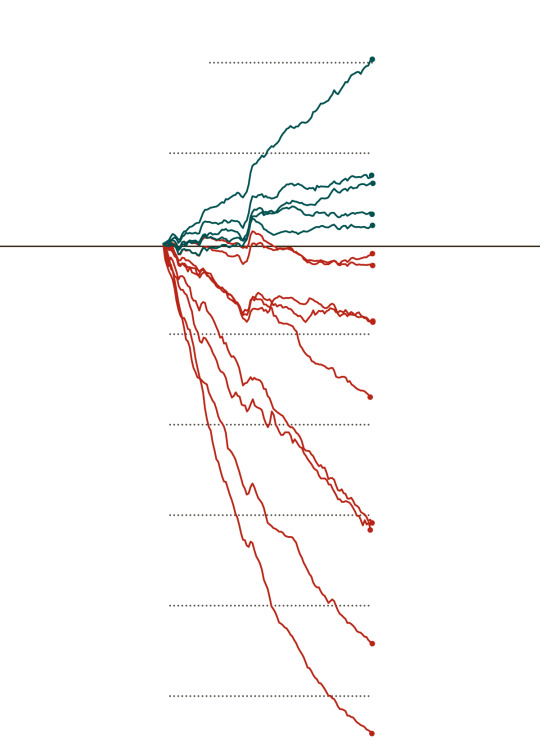
MINIMUM WAGE BILL DEFEATED YESTERDAY IN SENATE. And, at the same time, access to the stuff that helps lift people out of poverty -- quality preschool, quality food, health care -- is becoming increasingly out of reach for poor Americans. (This chart, from the front page of today's TImes, also shows the inflated costs of college, but at least there are grants and loans available to help poor students, at least for those able to untangle the financial aid system.)
What poor people can increasingly afford, however, are TVs, computers, phones and toys. Those are all good things which are necessary to staying connected to our global world.
But until our poorest friends and family can eat well, be well, and become well educated, all the Facebooking and Game of Thrones-watching in the world isn't going to make our cities less violent, our jails less full (U.S. jails more citizens than any other country, at four times the rate of Russia. Nice.), or our nation more equal.
0 notes
Quote
"A lot of the backlash against affirmative action is based on fear and negative connotations attached to the term, not the idea. We cannot afford as a nation to take steps backward that limit individuals from achieving access to education, employment and their civil rights."
That's John Burnett, writing to the editor in today's Times about the Supreme Court's decision this week to uphold Michigan's ban on affirmative action in state universities (turns out most justices feel it's up to the states to decide, not the court).
Here we are 149 years after the abolition of slavery. And yet many of our students of color are still dependent on policies like affirmative action (or, as John Burnett's university prefers to call it, a diversity and inclusion plan) to get into college. Where affirmative action has been outlawed, like in California, numbers of black and Latino applicants has dropped significantly, especially at the most prestigious schools.
In an attempt to provide economic diversity on campus, many top universities have been looking at other kinds of data, such as family income or whether a student is the first to go to college. President Obama has also announced that getting more low-income students into college will be a priority for his administration.
We applaud any efforts to get underserved populations into higher education, but we also hope that these well-intended folk are analyzing what truly works to get them there: high-quality preschool, caring parents and guardians, development of character strengths like grit and curiosity, early and frequent discussions about college. (We cannot recommend highly enough Paul Tough's book, "How Children Succeed," a veritable anti-poverty and education primer which describes the research into and value of many of these approaches).
We are very taken with a program we just discovered called the Schuler Scholar Program, which selects promising 7th and 8th graders in underserved areas (mostly in Lake County, Ill.) and provides academic and social coaching all through high school, gets them admitted to elite schools like Harvard, Dartmouth and Pomona, then provides mentoring and more coaching all through college. So far, nearly 800 students have been chosen as Scholars.
That may very well be 800 more first-generation and low-income students who have gone or will go to elite schools than might not have attended at all.
#affirmative action#university of michigan#paul tough#schuler scholar#wealth#first generation college
2 notes
·
View notes
Photo

Spring comes little, a little. All April it rains.
The new leaves stick in their fists; new ferns still fiddleheads.
But one day the swifts are back. Face to the sun like a child
You shout, 'The swifts are back!'
-- By Anne Stevenson, excerpt from "Swifts," 2005
Spring is here, although not quite yet in as full bloom as the Chicago Botanic Garden crabapples (above), but it is Earth Day. So time to dream about what might be.
In the spirit of spring's symbols of rebirth and renewal, it seems especially appropriate to celebrate an article in today's WSJ, "We Actually Get Nicer with Age."
Researchers analyzed personality and well-being data from 30,000 people and found that there are essentially five personality traits, which they believe are half nature, half nurture. These traits are characteristic ways of "thinking, feeling and behaving that is consistent over time and across situations."
They are:
Conscientiousness: Organized, consistent, dependable. Tends to increase with age as people become more invested in relationships and careers.
Agreeableness: Polite, trusting, compassionate, preferring cooperation over competition. Tends to increase with age as people meet expectations of family members and colleagues.
Openness: Curious, inventive, sensitive to art and beauty (see photo and poem above), imaginative. Tends to stay constant or decrease with age, but some work to develop these traits.
Extroversion: Talkative, sociable, assertive, socially dominant. Tends to diminish with age as people work on maintaining relationships rather than see new ones.
Neuroticism: Worried, stressed, sad or anxious, temperamental, moody. Tends to diminish with age as people learn to regulate negative emotions, distract themselves and avoid unpleasant situations.
See? Now we have spring and a nicer self to look forward to.
2 notes
·
View notes
Video
JUST TRYING TO FIGURE IT OUT. That's the focus of 15-year-old Tavi Gevinson's talk (and now the Oak Park high schooler and editor of the super-cool Rookie is 17 years old; as May 1 approaches, we wonder where she's going to college?).
What great advice for all of our kids: you're just figuring it out, it's the job of adolescence. And, as our own kids prepare to apply to colleges, we are reminded to reassure them that it's okay to be undecided about what to study in college or do with their lives. We are all just figuring it out. Still.
1 note
·
View note
Photo
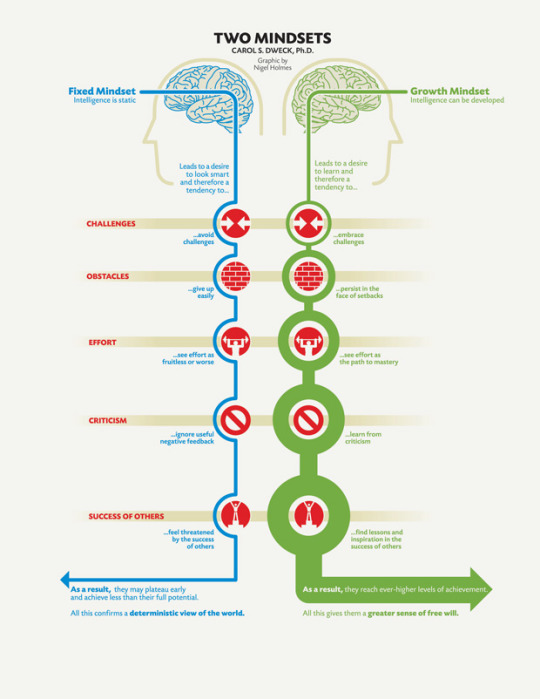
IT'S THE MINDSET, STUPID. It's been years now, but we remember an earnest mother asking Madeline "The Price of Privilege" Levine (a FAN love!) how to help her son reach his academic potential. She told the mother to relax and let him dictate when he was ready to commit wholeheartedly to his studies.
While we recognize now that it was a pretty good answer, at the time, it seemed pretty underwhelming (as we imagine it also was for the mother, who, no doubt, had wanted to leave that lecture with a strategy in her pocket).
Perhaps that mother will show up to learn from Carol Dweck, also a Stanford researcher like Levine, who may have offered an answer that would have soothed her. Her research about mindset -- the idea that qualities such as intelligence, creativity and athleticism are actually abilities that can be cultivated and grown -- provides concrete ideas about reaching one's potential (as shown in the chart, above).
Click here for 10 things parents can do to promote a "growth" mindset, one that believes intelligence and other qualities are not "fixed" from birth -- one is not "smart," or "gifted" or "athletic" -- but rather one works hard, fails and learns from mistakes, then succeeds.
Easier said than done, of course, as all worthwhile "10 step" lists are. But we challenge you to see where you fall on the growth-fixed mindset spectrum. We've got a ways to go until we are at full-tilt "growth," but growing into a life-long learner with a greater sense of free will seems like ample reward.
Catch Carol Dweck on May 9 at Evanston Township High School.
2 notes
·
View notes
Photo
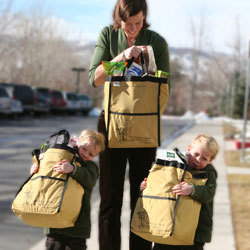
PRAISE BE! Raising generous kids is actually more complicated than just thanking or praising them for helping out or being kind. That's what FAN fave Adam Grant wrote in a big Sunday Times article, "Raising a Moral Child." Being a naturally nice kid only accounts for about 25-50 percent of generous souls, the "Give and Take" author noted, so how to encourage the rest?
Contrary to all we've learned from Carol Dweck (our next FAN speaker, on May 8!) about the value of praising actions ("I love the vibrant colors in your painting, sweetie!") as opposed to praising the person ("You're such a talented artist!"), it's most to effective praise the character behind the person when encouraging generosity.
"Praising their character helped [children in a study] internalize it as part of their identities," Grant said. "The children learned who they were from observing their own actions: I am a helpful person."
And, get this, this kind of praise is most effective when kids are small, ages 2-8ish. In the later years, praising both character and actions works.
We know, we know, so many rules to keep straight! We plan to adopt both forms of praise, just to cover our bases. After all, the world needs as many generous people as it can get.
0 notes
Quote
"She got me to pay attention to her when I was so very busy."
That's Alice Waters talking about her now-grown-up daughter, not only a very real force for practicing mindfulness, but also the impetus for creating the first Edible Schoolyard project in a paved over schoolyard in Berkeley. The Edible Schoolyard Project has since expanded to 3,741 locations around the world. It's Alice's fervent dream that all American schoolchildren receive a lunch made with organic food grown nearby, for free.
Don't laugh: the New York Times editorial board called for free lunches for all NYC schoolchildren just this morning; no mention of organic anything, but it's a start, right?
0 notes
Photo
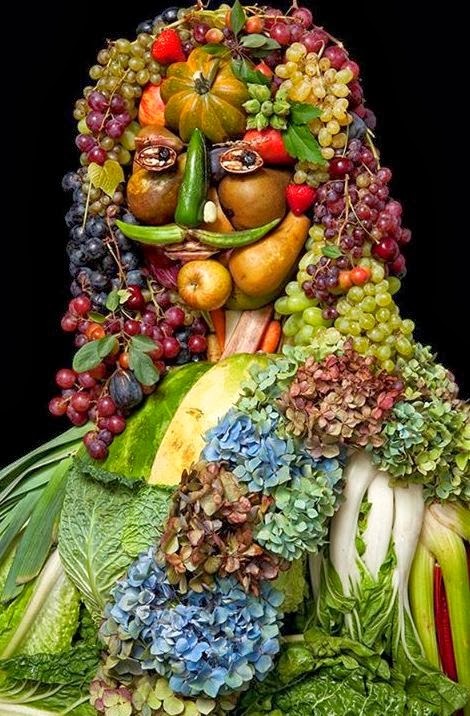
YOU ARE WHAT YOU EAT: In the style of a Renaissance painter named Guiseppe Arcimboldo, contemporary photographer Klaus Enrique has created the ultimate "you are what you eat" portrait.
We wish we could say we routinely ate the newly recommended seven daily servings of fruit and veg (or, as one woman was recently quoted on BBC World News, "I like fruits and vegetables. But maybe not every day."), but we are inching in that direction.
We are hoping to get lots of inspiration from tonight's FAN speaker, Slow Food icon Alice Waters. As the Huff Post put it: "Alice Waters has shaped our food culture, our restaurants, our home kitchens, and even our gardens for more than four decades. Let's hope she can (re) shape us.
0 notes
Photo

COWS ARE OKAY. And so is their milk, cheese, butter, and meat (grass-fed only, please, and within reason). Whew! We were getting so tired of dry toast and skinless chicken breasts.
The real killers in our diets, at least according to a Times Op-Ed piece by Mark Bittman (known for his cooking apps and recipes in the Times Magazine), are sugar and super-processed foods. Don't believe him or Michael Pollan (one of the world's biggest crusaders for fresh fruits and veggies)?
Please turn to your latest issue of the Annals of Internal Medicine for its recent meta-analysis which found that saturated fat doesn't increase heart disease. Julia Child is beaming from heaven!
And so is FAN's next speaker Alice Waters. The queen of sustainable food visits on Tuesday, April 8, to talk about her Edible Schoolyard project and the importance of eating food grown and harvested nearby. It's the next-best thing to a reservation at Chez Panisse.
0 notes
Quote
"The world will be saved by the Western woman." -- Dalai Lama, Vancouver Peace Summit, 2009
We admit it. We were totally unaware of this statement. Until yesterday. We like to think of ourselves as current on world events, but this totally slipped our radar.
The wild thing is, it had as much impact yesterday as it did five years ago when the Dalai Lama had the wisdom and courage to speak the words.
We had the good fortune to hear these words spoken again yesterday at one of FAN's *free* mediation sessions. Women who practice mindfulness, who stop in the midst of all the hair-pulling-ly crazy moments we have each day and ask ourselves, "What would love do?" could be the ones to make change in the world.
Leader Annmarie Chereso, founder of The Mindfulness Project in Chicago, which teaches mindfulness to students, illuminated the very thing that we have struggled with for years: how to maintain calm in the face of our kids' raging storms.
For so long, we thought it was our job as mothers to instill -- and, at times, demand -- peace at home. Turns out is that all it takes is the willpower to do nothing. To stay calm and let the storm subside on its own.
We imagine that will be our life's work, developing that willpower. But if we were able to harness it, we imagine that the world very well could be saved by us.
0 notes
Photo

Ishmael Beah came to Evanston last night. He shared a continent of sorrows and left only sunshine. No wonder his new book, which he read from, is called "Radiance of Tomorrow."
In his lilting accent, he weaved stories about the importance of imagery in his native language and how he translates it to English ("the sky rolled over and changed its sides" instead of the more prosaic "night came suddenly"); the colors, shapes and sounds of the natural world; the horrifying atrocities that child soldiers were forced to commit during civil war in his native Sierra Leone. Despite the tragedies he presented, he laughed a lot.
He spoke of forgiveness. And how his people, despite living through wars and having their land and lives destroyed again when they returned to their homes, are still able to set aside their grievances and focus on the joys of the here and now.
We hear a lot of academics talk about resilience and its power to overcome hardship. Ishmael Beah and his fellow villagers show how to do it.
0 notes
Video
youtube
"AN ODE TO HAPPINESS THAT COMES FROM BEING WITH THOSE DIFFERENT FROM US." Could there be any more of a ringing endorsement? What are you waiting for?
0 notes
Photo








BEST. BIRTHDAY. PARTY. EVER. So our dear friend Wendi Biemer, one of the most generous souls you'll ever meet, celebrated a milestone birthday today with about a dozen girlfriends. In lieu of gifts, each woman had "given" a random act of kindness in Wendi's honor and shared it with the group. The "gifts" were as unique as the givers: donating six months rent to an abused woman, feeding a block's worth of strangers' parking meters, donating a gift card at a local grocery to be given anonymously to an employee in need.
During dessert, the women shared examples of Wendi's boundless generosity: the time she brought food and magazines for a mom whose child had just been hospitalized, the time she supervised the kitchen for a friend's son's "homegrown" wedding (and cooking is not exactly her thing), the many times she welcomed a new acquaintance into her warm and sheltering orbit.
Bon voyage, Wendi! Springtime in Paris is your just reward!
0 notes